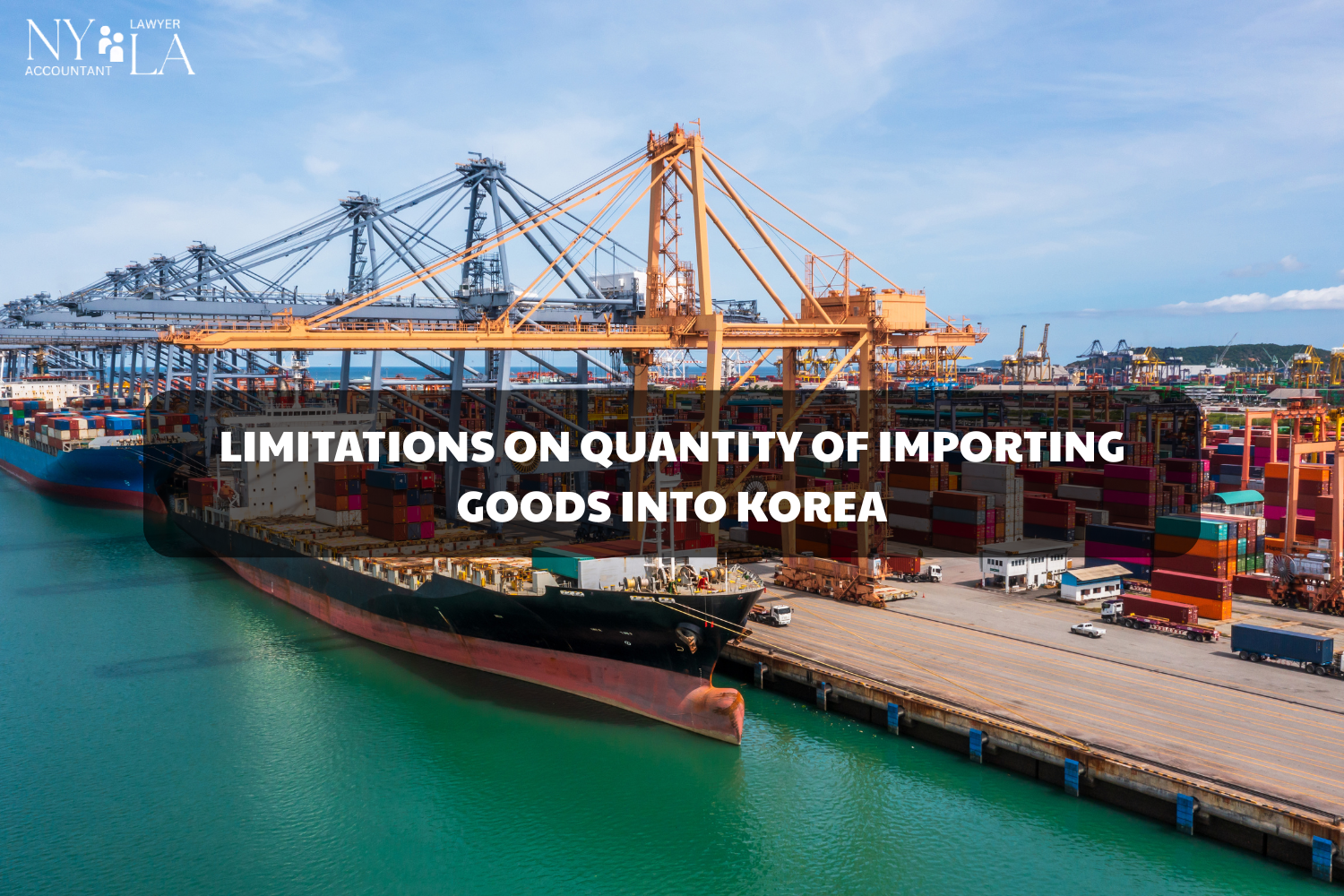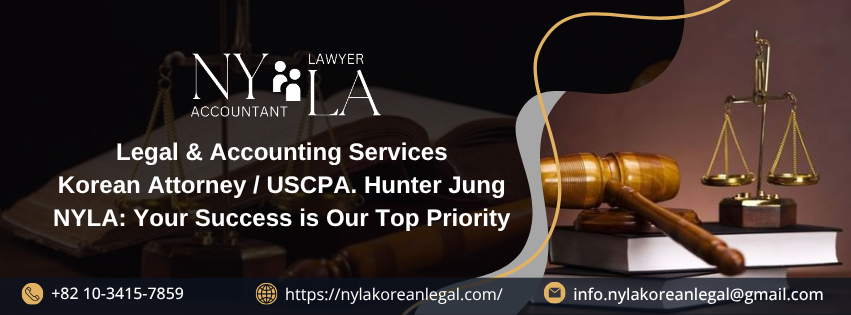Understanding the limitations on quantity of imports into Korea is essential for foreign exporters, trade advisors, and companies aiming to access the Korean market. South Korea, known for its robust industrial policies and strong regulatory framework, enforces import quantity restrictions under specific conditions to protect its domestic industries.
In this comprehensive guide, we explore the legal basis, reasons, authorities involved, and possible extensions related to limitations on the quantity of imports into Korea.
Summary
- 1. Legal Basis for Limitations on Quantity of Imports into Korea
- 2. Why Does Korea Impose Limitations on the Quantity of Imports?
- 3. Who Has the Authority to Impose Quantity Limitations on Imports?
- 4. Extension and Revision of Import Limitations
- 5. Implications for Foreign Exporters
- 6. Balancing Protection and Global Trade Commitments
- 7. Conclusion: Staying Compliant with Import Regulations in Korea
- 8. About NYLA – Korean Legal Office
1. Legal Basis for Limitations on Quantity of Imports into Korea
The primary legal authority governing limitations on quantity of imports into Korea is the Foreign Trade Act. This legislation enables the Korean government to intervene in international trade when an increase in imported goods threatens the stability of local industries.
These restrictions are not imposed arbitrarily—they are based on a thorough investigation and formal recommendation by competent agencies. The legal structure ensures a fair balance between protecting domestic production and upholding Korea’s international trade commitments.

2. Why Does Korea Impose Limitations on the Quantity of Imports?
2.1 Preventing Serious Damage to Domestic Industries
The limitations on quantity of imports into Korea are primarily introduced when Korean authorities determine that certain imported goods are causing—or are likely to cause—serious injury to local industries. These goods might compete directly with domestically produced items, resulting in revenue losses, employment decline, or reduced market share for Korean businesses.
Such protective measures are often justified after investigations reveal:
-
A sharp increase in imports of specific goods;
-
Direct competition between domestic and imported goods;
-
Evident or probable severe injury to local industry.
The Korea Trade Commission is responsible for conducting these investigations and issuing formal recommendations to the government.
2.2 Duration of Restrictions
The limitations on quantity of imports into Korea are not indefinite. According to the Foreign Trade Act, the maximum duration for such measures is four years. This time frame is designed to give the domestic industry time to recover, restructure, or adapt without leading to long-term market distortions.
3. Who Has the Authority to Impose Quantity Limitations on Imports?
3.1 The Role of the Korea Trade Commission
The Korea Trade Commission (KTC) plays a central role in identifying the need for import limitations. Upon receiving complaints or recognizing patterns of trade imbalance, the KTC conducts detailed market impact analyses and assesses the level of injury caused by imports.
3.2 Minister of Trade, Industry and Energy
Once the KTC confirms the need for action, it recommends the imposition of limitations on quantity of imports into Korea to the Minister of Trade, Industry and Energy. The Minister is responsible for:
-
Issuing official public announcements;
-
Specifying the list of goods subject to import limits;
-
Stating the quantity allowed;
-
Indicating the effective duration of the restriction.
This ensures transparency and legal clarity for all international stakeholders involved in trade with Korea.
4. Extension and Revision of Import Limitations
4.1 When and How Can Limitations Be Extended?
The limitations on quantity of imports into Korea may be extended beyond the initial four-year period, but only under specific conditions. The extension process also begins with a new investigation or a follow-up recommendation by the Korea Trade Commission.
If continued protection is deemed necessary, the Minister of Trade, Industry and Energy may extend the limitation period, revise the restricted quantity, or amend other conditions of import. However, the total period, including any previous emergency tariffs or provisional safeguards, must not exceed eight years.
This limitation ensures that the import restrictions are temporary, promoting market rehabilitation without violating global trade norms.
5. Implications for Foreign Exporters
Foreign businesses must stay informed and proactive when engaging in trade with Korea, especially if their goods fall within sensitive or competitive sectors. The enforcement of limitations on quantity of imports into Korea can have significant implications such as:
-
Sudden decrease in allowable export volume;
-
Requirement for compliance with quota systems;
-
Potential need for Korean legal representation;
-
Adjustments to existing trade contracts.
Companies must monitor trade bulletins and announcements from the Ministry of Trade, Industry and Energy, as well as recommendations issued by the Korea Trade Commission, to stay ahead of policy changes.
6. Balancing Protection and Global Trade Commitments
South Korea’s imposition of limitations on the quantity of imports is consistent with its rights under the World Trade Organization (WTO) agreements. Like many other economies, Korea uses these mechanisms sparingly and only when necessary to defend against harmful import surges.
That said, the government remains committed to open markets, free trade, and reciprocal market access, which is why these restrictions are:
-
Evidence-based,
-
Time-limited,
-
Transparent in procedure.
Foreign exporters and trade professionals should view such policies as tools of temporary adjustment, not long-term barriers.
7. Conclusion: Staying Compliant with Import Regulations in Korea
Understanding the rules surrounding limitations on quantity of imports into Korea is essential for international businesses and legal advisors. These rules, although protective in nature, are governed by transparent procedures and backed by clear legal frameworks.
To operate smoothly within the Korean market:
-
Stay informed about goods subject to limitations;
-
Monitor updates from Korean trade authorities;
-
Ensure legal compliance through local agents or attorneys when necessary.
By navigating these import quantity limitations with care and knowledge, foreign businesses can continue to thrive in one of Asia’s most dynamic economies while respecting Korea’s legal and trade protections.
8. About NYLA – Korean Legal Office

■ NYLA – Your Trusted Legal Partner in Korea
At NYLA, we understand that the success of foreign businesses in Korea requires not only a solid business strategy but also reliable legal support. With a team of experienced Korean attorneys and legal professionals, NYLA provides tailored legal services for companies, investors, and individuals operating or planning to establish a presence in Korea.
We support our clients throughout the entire business journey with comprehensive services, including:
- Legal consultation on company establishment, taxation, and immigration;
- Advice on commercial real estate, franchising, and product distribution;
- Support in human resources, marketing, and business strategy.
In addition to legal advisory, NYLA also represents clients in civil litigation cases related to business, labor, marriage, family, and inheritance to ensure their rights and interests are fully protected.
■ Contact NYLA

If you’re a foreign business or individual looking for a reliable legal partner in Korea, NYLA is here to help. We are committed to delivering effective, practical, and personalized legal solutions for every client.
With a proven track record of assisting hundreds of international clients, our team is equipped to help you navigate complex legal challenges—whether it’s commercial disputes, contract issues, or foreign investment guidance.
Don’t let legal matters hold you back. Let NYLA be your trusted guide in the Korean market.
■ Get in touch with NYLA for expert legal support
| Website: https://nylakoreanlegal.com/
FB: https://www.facebook.com/nyla.koreanlegal Tiktok: https://www.tiktok.com/@nylakoreanlegal Youtube: https://www.youtube.com/@NYLA-xd8qx Email: info.NYLAkoreanlegal@gmail.com SĐT: +82 10-3415-7859 |
 |






















































